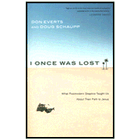Everts, Don and Schaupp, Doug. I Once Was Lost: What Postmodern Skeptics Taught Us About Their Path to Jesus. IVP Books, 2008. ISBN: 978-0-8308-3608-6.
Don Everts (pictured on the left) served as a campus missionary with InterVaristy Christian Fellowship for fourteen years in Washington and Colorado. He currently serves as minister of outreach at Bonhomme Presbyterian Church. Additionally, Everts is the author of eleven books including Jesus with Dirty Feet, The Smell of Sin, God in the Flesh, the One Guy’s Head series of postmodern apologetics and, most recently, I Once Was Lost: what postmodern skeptics taught us about their path to Jesus.
Doug Schaupp (pictured on the right) is regional director of InterVarsity Christian Fellowship’s campus ministries in Southern California. As writer, speaker and teacher, he focuses on racial issues, postmodern evangelism, and leadership development. Schaupp is the co-author of Being White: Finding Our Place in a Multiethnic World.
Book Basics
Written by authors with considerable experience in campus ministry, I Once Was Lost seeks to offer insight into how postmodern young adults come to faith. Rather than seeking to create a theory, Everts and Schaupp combine their wisdom of interacting with over 2,000 postmodern people on college campuses and suggest most who come to faith do so by progressing through five thresholds.
- Trusting a Christian – creating a genuine friendship with a Christian

- Becoming Curious – generating authentic curiosity about Jesus
- Opening up to Change – realizing personal change will be required and becoming open to that possibility
- Seeking After God – earnestly searching with urgency and purpose
- Entering the Kingdom – placing faith in Jesus and beginning a life of discipleship
So What?
As the culture becomes increasingly postmodern, individuals and churches will begin to learn the same lesson that Everts and Schaupp learned: modern evangelistic techniques and strategies are ineffective with postmoderns. The pathway to faith for this emerging group is outlined above. Not all will follow this path, but it appears that the vast majority of postmoderns will for the next several years. While postmoderns may appear more fluid and open to change the research suggests that they find opening to change the most difficult threshold to cross.
The only time at which modern or propositional evangelistic techniques are of any value is in moving from the fourth to the fifth threshold. At this point, would-be Christians seem to welcome the push and a clearer understanding or idea of what it means to be a Christian.
It is essential that you know where a postmodern person is on the path and meet that person there. It is also critical to follow up and disciple new believers as they enter the kingdom.

